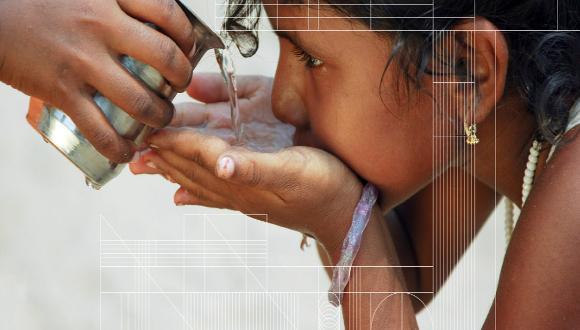Namaste harmful waste
A groundbreaking study addresses the contamination of groundwater and drinking water in India
Prof. Hadas Maman, Head of the Environmental Engineering program at TAU's Faculty of Engineering, together with Prof. Mohan of IIT Madras in India, are looking for effective ways to prevent the contamination of groundwater and drinking water with runoff from open dumps in and around the city of Chennai, India.
India is the world's 7th largest country in area and 2nd largest in population. Over the past three decades it has undergone accelerated economic growth, including a rising standard of living, which, in turn, has generated increasing quantities of waste per capita. The systems managing solid waste – collecting it from the private and public domains, treating, separating, recycling and disposing of it by way of landfills or incineration – have not been adapted to the growing needs. The result of this situation is great environmental damage.
'Garbage juice'
Solid waste discarded as is, in its solid form, is undesirable. In India, open dumps are the most common method for disposing of municipal solid waste. This means that the waste is thrown into the dumpsite with no management or treatment whatsoever of the waste or its products.
In most developing countries almost 90% of the waste is disposed of in dumps (Data from the World Health Organization). In many developed countries, on the other hand, sanitary landfills provide the ultimate option for waste disposal. The ongoing process of urbanization significantly increases the rate at which municipal solid waste is produced. This, in turn is a source of groundwater pollution from dump runoffs that seep into the soil. Interaction between waste and water, especially during the rainy season, or in the summer when fluids seep in from the dumps, generates extremely polluted wastewater called leachate.
Leachates are highly toxic because they contain a liquid extract of waste substances, popularly termed 'garbage juice'. Many different factors can impact the quality and quantity of leachate, including weather changes, how the waste had been deposited, waste management, compaction, type and composition, structure of the dumpsite, etc.
Leachates contain large quantities of organic matter. Humic substances comprise a major group, together with ammonia, nitrogen, toxic metals, organic chlorine, phenol compounds, residues of pesticides and phthalates – chemicals used mostly as additives to plastic products, considered major pollutants by the US EPA.
Disintegrating and removing substances
Physiochemical processes have been used successfully for the disintegration and removal of substances from stabilized leachate – as preliminary treatment before biological treatment. In particular, Advanced Oxidation Processes (AOPs) have been extensively used to completely remove various non-biodegradable organic compounds that may be toxic for microorganisms.
Pollution-prevention solutions
The goal of the study is preventing the contamination of groundwater by leachate from open dumps in and around Chennai, and devising an economically efficient process that can be applied and managed by the local population. In this way we hope to minimize the negative effects of toxic substances penetrating the drinking water on the health of communities surrounding the dumps. Ultimately, we intend to establish a life-changing pilot program. The pilot, to be located at the dumpsite itself, aims to develop a sustainable technology that will combine oxidation (partial degeneration) and a biological process including green basins fed by the treated wastewater, to completely remove organic pollutants and chelate metals. The purified wastewater will be used for irrigation, and plants absorbing the pollutants will be used as fodder. Thus the combined process will both purify the wastewater and improve the social and economic conditions of village communities. In addition, the purified wastewater will be used for growing agricultural crops.
Basic need!
"Safe potable water is a basic need. A suitable technology alone cannot solve water problems. We must also work together with the local society, so that the community itself is empowered by having potable water, and can independently manage its own water resources and make its own decisions. To create suitable conditions for implementing the technology we must also bring instruction and education, introducing introduce the environmental ideas around, water, energy, agriculture and food," explains Prof. Maman, already on her way to India, to promote her life-saving project.





